Food is a significant
aspect of life
If you have not noticed how food and
meals are a significant aspect of human life and
our
culture, here are some issues to consider:
•
Searching for food is the major daily activity of animals and
prehistoric humans, so they don't have much leisure time for other
activities. However, modern technology allows us to produce so much
food that only a small percentage of the population has to produce
food, which allows the majority of people to do something else.
What do we want those other people to do? Do we want them to conduct
research into human health, develop better computers, or build a better
train system? Or do we want them to play sports for us, build gambling
casinos, breed pet dogs and cats, produce alcoholic beverages, or make
movies?
We have an
infinite number of options, but in a free enterprise system, these
decisions are made as people, including children, spend
money. In order for us to make better decisions, we must change our
government and economic system so that we have leaders with the
authority
to discuss and determine our future.
• Animals gobble food as rapidly as possible rather than enjoy
their meals. Modern humans, by comparison, use meals as a social
activity. Unfortunately, a lot of people are lonely,
or they are living or working among people that they don't know or feel
awkward around. We should improve our social environment so that we
enjoy having meals with other people.
• A
tremendous amount of land is required to produce the food we need, and
this reduces the size and number of forests, creeks, and rivers for us
to enjoy.
• Farmers use a lot of herbicides, pesticides, and other chemicals of
questionable safety to ourselves and other creatures.
• We produce much more food than we need, possibly wasting
more than a third
of it, which means that we are wasting a lot of our
labor,
land, and chemicals.
• We are harvesting so many salmon, whales, lobster, and other sea
creatures that we are decreasing the amount available to us. We are
also reducing the supply of sea creatures by polluting the water and
building dams.
•
Every home has a kitchen with a stove, refrigerator, dining room table,
and a variety of other food related items. That is a significant amount
of material items to produce and maintain.
This requires a lot of people to become assembly-line workers,
which nobody seems to enjoy.
•
By processing and eating food inside of our homes, we make it easier
for ants, cockroaches, mice, and other creatures to live in our homes.
•
Most people have so little self-control that they eat
excessively,
and/or eat unhealthy diets, causing themselves a lot of misery, and
becoming a burden on the healthcare system.
• If nobody was eating excessively, we could reduce the amount
of land and other resources we use for producing food.
•
Most people are producing meals for themselves or their family two or
more times a day, which means that a tremendous amount of labor
is going into the production and cleanup of meals. It is significantly
more efficient for a small number of people at a restaurant to provide
meals for a large number of people than it is for each person to make a
meal for himself or his family. However, in a free enterprise system,
the meals at restaurants are so much more expensive that it causes
people to make meals for themselves. To restate this, the
free enterprise system is so crude that we cannot benefit from the
efficiency of restaurants.
Kastron is
designed to improve food and meals
Despite the significance of food, no
society is yet putting any
effort into analyzing food related customs, or experimenting with
improvements. Instead, we are allowing our food customs to drift about
aimlessly, and we allow businesses, religious groups, vegetarians, and
other people to manipulate our food customs to suit their particular
desires. Kastron, however, is specifically designed to improve the
situation with food and meals. Two primary differences with the
Kastron culture are:
1) The government will control the economy
and culture.
The
government will have authority over all farms, food production,
restaurants, and other culture. The government officials will determine
which foods are produced, and in which quantity. The farmers and food
processing businesses will
follow instructions from the government rather than
pander to consumers.
2) Nobody will have a kitchen.
Everybody
in Kastron will live in an apartment building, but none of the
apartments will have kitchens or dining rooms. Everybody will get food
from restaurants. There will also be markets for us to pick up food
that doesn't need preparation, such as fruit and snack bars, for when
we want to take food with us for a picnic, bicycle ride, or walk in the
forest.
Those two changes will provide us with a lot of significant
advantages. The
following sections will discuss some of those advantages.
•
We save
time on food chores
By
getting meals at restaurants, nobody has to waste any of their life on
meal-related activities, such as shopping for food,
preparing meals, and cleaning up the mess. It also eliminates the time
and frustration involved with purchasing, repairing, and cleaning all
of the food related equipment, such as stoves, refrigerators, microwave
ovens, knives, and dining room tables.
In a free enterprise
system, restaurants require that we pay for everything, and in the USA
we also have to deal with tipping. This requires
us to carry
money or credit cards, which means worrying about losing them and
having them stolen. However, in Kastron, the restaurants, and
everything else, are free, so we don't waste any of our time with bills
or tipping, and we don't have to carry wallets or credit cards.
In
Part 1 of this series, I pointed out that instead of fantasizing about
living longer, it would be more beneficial for us to reduce
the time we
waste. Some people might respond that they enjoy
making meals, but that might be only because they have nothing
better
to do in their leisure time. A lot of the activities that
people are
choosing to do right now are being chosen because of the lack of better
alternatives, not because the people truly care about those activities.
 |
| Would
you want to spend your time
alone in a kitchen if you were living in a beautiful city that provided
you with drinks and meals for free? |
If
we were living in a city in which we enjoyed and respected the other
people, and in which the city is beautiful, and in which we have lots
of free recreational and leisure activities to choose from, all of
people who like to make meals might
discover that they would rather go out in the city and do something, or
just relax in the city with a friend,
rather than spend an hour or two alone in a kitchen.
The people who truly enjoys making meals would have the
option of working in a restaurant, and the Kastron government would not
care whether they were working full-time, or as seldom as one evening a
month. I think this will provide those people with more
satisfaction because it allows a lot of people
to appreciate their
meals, whereas only a few people appreciate their meals when they are
making meals only for their friends or family.
•
Food
distribution becomes more efficient
In all existing nations, most of the food
is sold to individual citizens and their families, rather than
organizations, such as restaurants and cafeterias. The food is provided
in small packages, and is distributed to markets that
are scattered around
the city. Trucks deliver most of the food to the markets.
The situation will be significantly different in Kastron. Since nobody
in Kastron will have a kitchen, most of the food will be delivered to
restaurants, although there will be some small markets that provide
citizens with food for picnics and snacks.
Since most food is shipped to restaurants, the farmers and food
processing businesses (I will refer to them as "food producers" for
simplicity) will not put many of the food items into small packages
for consumers. Rather, most of the food will be put into larger,
reusable containers that stack on one another, and the containers will
be put onto trains. The trains will deliver the food to the clusters of
buildings in the city, and the empty containers will be sent back to
the food
producers. This will be much more efficient, and significantly reduce
the amount of trash that is generated from packaging.
Since the restaurants will be located in the clusters of buildings, and
since every cluster will have a train station, the food will go
directly from the trains into the restaurants without being transferred
to trucks. The containers of food will travel only short distances from
the trains to the freight elevators, and then travel another short
distance to the restaurants.
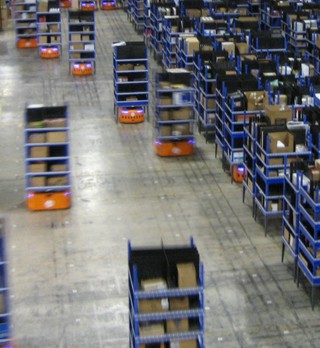 |
| The
orange devices are the robots that are moving
containers of items around the warehouse. |
Rather than use unskilled laborers to
move the packages of food from the trains to the
restaurants, Kastron is designed for robots to move items in
and out of
trains at each of the clusters of
buildings. The freight elevators would be designed for robots, also. It
would be similar in concept to the Amazon warehouses
in which robots
are moving containers around.
To summarize this flow of food, the food producers would put the food
into containers that stack on top of each other, and robots would put
those containers into trains. At
the train stations, robots would take the containers out of the trains,
into the freight elevators, and into the restaurants.
Every cluster of buildings will have a robotic delivery system at one
area of the
train station. The trains that carry freight will stop at that robotic
station to load and unload items. This allows items to be distributed
throughout the city
without human labor. This system will distribute food, packages,
medicines, clothing, sports equipment, musical instruments, industrial
supplies for businesses, and supplies for arts and crafts clubs. This
system will also remove trash, and send items to recycling centers.
In previous documents I pointed out that when people borrow bicycles or
cameras, they do not have to return them to the place they picked them
up. The reason is because the robotic delivery system will deliver the
items to wherever they are needed.
 |
| Apples,
peaches, tomatoes, and other fruit are bruised by dumping
them into large containers. |
Food will be given better
protection
In a free enterprise system, the emphasis is on profit, and this
results in the food producers dumping avocados, tomatoes, apples, and
other items into large containers, which can smash and bruise
the items.
In Kastron, however, the emphasis is on human life, and so
the containers that the food producers use will be higher-quality, and
designed to protect the food. This will be more expensive, but so
what?
We should also develop robots to pick more of the fruit. Those
robots would require a lot of labor to design and build, but so
what? We will provide a better life for ourselves by
eliminating undesirable chores and putting more emphasis on the quality
of our life.
Peaches and other delicate items could be put into
containers that have a lining of foam, with a depression for each item.
The containers would stack up on each other, and be sent throughout the
city on the underground train system. A restaurant would take one or
more of the containers of peaches.
|
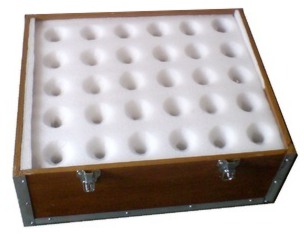
Delicate fruit,
such as peaches and apricots, could be shipped in foam depressions.
|
|
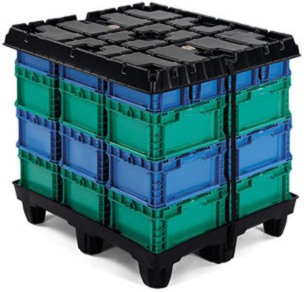
The containers would be stacked, and
each restaurant would take as many as they needed. |
There would be no consumers to squeeze
and sniff a peach or other item, and then put it back, then
squeeze and sniff another. Instead, the restaurants would
take one or more containers without inspecting them. When the
containers of food are empty, they are sent back to the farms to be
reused. There would be no wasted paper or plastic.
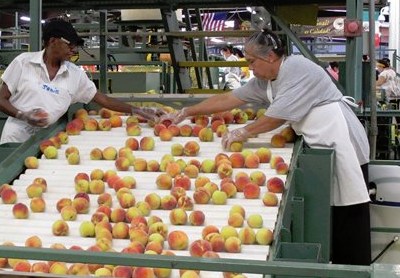 |
The
restaurants and consumers should
inspect perishable food, not the food
producers. |
By distributing food for free, the food
producers can avoid the extremely boring job of
inspecting perishable food items
that are traveling down conveyor belts. Since perishable items can
deteriorate after they have been packaged, it is
more sensible to tell the final user to do the
inspection.
Machines would do simplistic inspections, as
they do today, but the people at the restaurants will do the final
inspection when they are ready to use the food. If
some item is bad,
they discard it. Since they did not pay for the
food, they will not
complain that they just spent their money on damaged food.
In a free enterprise system, food producers have to create
identical packages of specific weights or quantities, but when the
restaurants are given food for free, the food producers don't need
to be concerned that some containers have less food than others.
The food producers can also avoid the machinery and chores involved
with pricing. The
farmers and government officials would keep track of
how much food they produce for management
purposes, but not
for pricing purposes.
• We would
have more variety in
meals
It is difficult for individual citizens
and families to provide themselves with a wide variety of meals because
it requires us to purchase a lot of different food items and spices,
and it requires that we have experience with lots of different recipes.
By getting meals at restaurants, however, we can have access to an
enormous variety of foods.
However, whether a variety of meals is beneficial
depends upon our
attitude towards life. Many years ago I wrote about
how I brought some
Mochi ice cream to a party, but almost nobody had the courage to try
it, and one person took a bite and then put it back.
Most people are so frightened of the unknown, and have such a strong
craving to follow established procedures, that they do not
want a
variety of meals. They want to eat the same foods over and
over. Their
attitude is that there is a correct way to make
ice
cream, pizzas, sandwiches, and other food items.
If we were to offer the typical person a wide variety of meals, they
would not regard the offer as a "variety" of meals.
Rather, they would
regard it as an enormous amount of bad, disgusting, incorrect, and
stupid meals.
What is the best way to make a pizza? What is the best
way to cook
chicken? The answer to that question depends upon our view of
life. I
would say that there is no such thing as a
"correct" pizza. Rather,
there are an infinite number of ways of making
pizza.
What is the best way to cook eggs? There is no correct or
best way. I prefer gelled
eggs rather than scrambled, hard-boiled, and
other types of eggs, but gelled eggs are not a single recipe.
Rather, there are an infinite number of ways of using gelled eggs. For
example, they can be put into a bowl and mixed with a variety of
flavorings, such as lemon zest, onions, or pumpkin pie spices. I
usually put the gelled eggs on flat sheets of bread, but even that is
not a single recipe because the sheets of bread can be made with
different types of grains, and they can have a variety of flavorings,
such as pizza spices, cinnamon and molasses, onions and turmeric, or
orange zest.
The same is true with burgers. A burger can be 100% ground meat, or it
can be a mixture of ground meat with bite-size chunks of meat. It can
also be a mixture of meat with an infinite number of other items, such
as spices, rice, or pieces of potatoes or vegetables. Furthermore, the
burgers can be eaten by themselves, or they can be combined with breads
to make sandwiches, or combined with corn tortillas to make various
types of enchiladas or tacos.
In a free enterprise system, businesses pander to the citizens, which
encourages us to become spoiled brats who demand what we want, and who
believe that we must be given what we want. When most people go to
restaurants, they demand certain types of foods that are prepared in
certain ways. They don't want to try anything different.
Furthermore, most people want foods that are extremely titillating to
their senses. As a result, businesses tend to use a lot of sugar. Sugar
is an ingredient in ketchup, salad dressings, and even some meat
products.
There is nothing wrong with putting sugar in our foods. The only reason
sugar is a problem for modern societies is because our emotional
attraction for sugar evolved for an era in which there was not much
sugar available, so if we eat foods according to our emotional cravings
rather than our intellect, we will consume more
sugar than our body was
designed for.
Every living creature evolved for a certain environment. Our lungs, for
example, evolved for a certain air pressure with a certain quantity of
oxygen. We evolved to drink a certain amount of water. Too much oxygen
or water will cause health problems.
Our emotions were not designed for a world in which we have access to
phenomenal amounts of sugar. We must exert some self-control and use
our intellect to ensure that we are providing our bodies with
appropriate amounts of oils, proteins, carbohydrates, oxygen, water,
minerals, and whatever else it needs. There are two primary
ways for us to deal with our extreme amounts of
food:
1) Let each person exert
self-control over his
consumption of food. This method is obviously not working very well
since most people are overweight and/or sickly.
2) Let the government control the production
of food products, and influence the meals that restaurants are
providing. Although this will not guarantee that everybody eats a
proper diet, it will make it much easier for us.
My recommendation is that Kastron try option 2. Although the Kastron
government will not control meals, they should put restrictions on
certain items. The possibilities are infinite. For a
few examples, the government might prohibit sugar in the
coating of chicken wings, and prohibit honey and brown sugar in pork
products, except for special occasions, such as holidays or weddings.
They might also restrict candy, donuts, soda, and other sugary products
to weekends or holidays, or restrict them to people who are getting
physical activity during their job, or during their leisure time.
Some people might complain that a government that puts restrictions on
food products is oppressive, but as I emphasized in
Part 1 of this series, these issues depend upon our view of
life.
I would say that a government that provides restrictions on food is
behaving like parents who put restrictions on what their children can
eat. Are those parents abusive?
I would say that the parents that provide their children with the
freedom to eat whatever they please are irresponsible
parents because they are allowing their children to ruin their health.
They are giving their children a freedom that the children cannot
handle. I would say that the parents who put restrictions on what their
children can eat are providing sensible guidance to
their children.
Of course, to complicate this issue, a government will provide us with
sensible food restrictions only if we have the
ability to provide ourselves with responsible, intelligent, honest
government officials and scientists. We are not
likely to get sensible food policies from the
pedophiles, Zionists, and criminals that
dominate the world today.
•
Restaurants would be easier to manage
My remark in this document, and other
documents, that a
person might want to manage a restaurant one evening a month, or one
evening a week, might seem bizarre, but in Kastron, managing a
restaurant would be much simpler and easier compared to a free
enterprise system.
Everybody in Kastron is an employee, so
nobody has to deal with rents, landlords, taxes, or other business
expenses. The chefs at the restaurant are employees of the government.
The government doesn't care whether a person works as a chef, mechanic,
gardener, or machinist one evening a month, or
seven days a week. As long as people are doing their jobs properly, the
government doesn't care if a person has 20 part-time jobs, or one
full-time job.
The chef at a restaurant doesn't own anything in
the restaurant. The government owns all of the buildings, furniture,
land, and everything else in the city. Furthermore, the restaurants do
not pander to the people, so the chef doesn't have to worry about
providing extensive menus, or dealing with whiny customers. A chef can
produce the foods that he wants to produce. He doesn't even have to
provide a menu. He has to design meals according to what the government
considers to be healthy, but he can choose to make whichever meals he
wants to make.
It would even be possible for a person to work as
a chef one evening a month to provide meals for a group of his friends
and relatives. One of the primary reasons for
eliminating kitchens in
the homes is to make food production more efficient, so if a person is
willing to make meals for a group of his friends and family members,
even
if he only does it once a year, then he will be fulfilling that
requirement, so he will be allowed to do it.
The relationship between the Kastron government and the citizens will
be similar to that between parents and children. If a child wants to
cook a meal for his family, and if he has the ability to do so,
his parents will let him, even if he wants to do it only once.
•
Restaurants can share everything
Since the city owns all of the land,
buildings, and material items, and since all of the restaurant
employees are essentially employees of the city, the city can design
restaurants so that they share equipment, heating and cooling
equipment, electrical lines, plumbing, and even employees.
For example, the city might put a cluster of five restaurants at the
bottom of a particular building, and although it appears as if they are
five separate, independent restaurants, the backs of the restaurants
may open up into the same area where all of them have access to the
same freezers, refrigerators, and automatic dishwashing machines. All
five restaurants may share the same electrical wiring, plumbing, and
the same heating and cooling lines.
If it seems bizarre that separate restaurants would share equipment,
remember that the city is like a one large corporation, or like a Navy
ship, or like a giant family. In a large corporation, for example,
there may be two different groups of machinists, each with different
managers and working on different projects for different groups of
engineers. However, some of the expensive equipment that neither group
needs full-time may be shared between them. Also, each machine shop may
be supplied with electricity, compressed air, heating and cooling
lines, and other utilities, from the same source.
This is how most people build their homes, also. Specifically, there
are separate bedrooms in the house, but they are not independent
apartment units with their own utility lines, bathrooms, and kitchens.
Rather, they share the same refrigerator, the same electrical lines,
the same plumbing, and the same heating ducts.
Since the employees of a restaurant belong to the city, the restaurant
can share employees, also. In other words, if one restaurant is busy,
and another is not, then some of the employees that don't have anything
to do can work for the other restaurant. The businesses do not own
their employees. Employees are not slaves, or animals. They are people.
The employees work for the city, and so do the restaurants. Therefore,
if one restaurant is too busy, and another has too little work, the
manager of the busy restaurant can ask for some of the unnecessary
employees at the other restaurant.
If that seems bizarre, consider a big corporation. If a particular
machine shop within the corporation is overloaded with work,
and another machine shop in that corporation has too little
work, the management will not tell the unnecessary machinists to play
games until they have some work to do. Rather, they will
tell them to go over to the shop that needs some assistance.
The businesses in Kastron compete with one another, but they compete to
make life better for the city, not for profit. They are separate,
independent businesses, but they all work for the same goal; namely, to
improve their city. The attitude towards the employees and equipment
will be significantly different than it is in a free enterprise system.
The employees, business executives, and government officials will
behave as if they are one big family. This will allow them to share
equipment, buildings, utility lines, and employees.
For another example of how the sharing would work, if one restaurant is
so busy that they are running low on their supply of pork or apples,
they can take food from one of the other restaurants. None of the
restaurants are purchasing food, so they don't own any of it.
The food belongs to the city.
The food will be distributed to each individual restaurant, and each
restaurant will put their supply into their freezers and storage units,
but none of the restaurants own the food, freezers, or storage units.
Also, the restaurants are judged according to how much food they waste,
so none of the restaurant managers want to waste food. They want the
city to use food efficiently.
In addition to sharing employees, they can also share managers. If one
particular manager is sick or busy, another manager can help, even
though he is a competitor. The people in Kastron get credit for the
work they do. They are not competing for profit, so they are judged
according to their contributions to society, not by whether they can
drive a competitor to bankruptcy.
In case it has not occurred to you, these concepts apply to all
businesses
in Kastron.
•
Meals will be smaller
The restaurants
that serve the public will be in competition with each other to
attract customers, but the
competition will be significantly different than it is in free
enterprise system. For example, the chefs will not be able to use
tricks, such as increasing the sugar or fat in their meals.
Furthermore, since the customers do not pay for the food, the
restaurants will be required to provide meals that are an appropriate
size for the customer, rather than offering enormous meals. A chef will
be considered as inferior if he provides such large meals that his
customers
become overweight.
Since nobody in Kastron will have kitchens or
dining rooms, the restaurants will not provide "doggy bags"
for customers
to take food home. Therefore, the chefs will adjust the
meals so that small women receive less food than large men. The
restaurants that produced the most food waste would be regarded as
having the most inferior chefs.
By judging the chefs
by their food waste, the chefs would be under pressure to make meals slightly
too small to ensure everybody
eat everything. The chefs would
also be under pressure to avoid giving people food items that they
don't want to eat. For example, instead of giving lima beans to
everybody without asking, the lima beans would be an option.
In
a free enterprise system, restaurants don't care about wasting food
because the customer is paying for the food. The pressure on
restaurants is to sell a lot of food, not care
about wasting food, or
care about the health of their customers. In a free enterprise system,
an obese person is regarded as an exciting profit opportunity, rather
than as a waste of society's resources.
The attitude
towards meals in Kastron will be considerably different. The pressure
on the restaurant chefs will be to behave like parents who are serving
meals to their children. Instead of providing people with a gigantic
meal, the restaurants will be under pressure to
provide smaller meals that will leave the people slightly
hungry. The people
who are so hungry after their meal that they want more to eat can get
more, just as is true when you are eating with your family.
In
other words, the attitude in Kastron will be to serve too
little food,
and tell people to get more if they are still
hungry, rather than serve
an enormous amount of food and allow people to waste food.
Another
option that the city officials might experiment with is for
the restaurants to provide
only one meal per person. If
a person is so hungry after his meal that he wants additional food, he
will have to get up from the table and go to another restaurant. The
advantage to this policy is that it forces people to walk around a bit
after eating. This will help the food settle, which can get rid of some
of the air that we swallow when we eat. This in turn can reduce
digestive irritations and farting. It can also force the people to get
a bit of exercise before they eat more food.
Furthermore, since
the restaurants will be clustered together in an area that has no
automobiles, when people have to walk from one restaurant to another,
they will encounter other people in the process, and
that can encourage people to get together with other people for a
second meal, or skip the second meal and go do something together.
The image below
might help you to visualize this concept. Imagine that the image is
showing a cluster of office buildings in Kastron. Along the base of the
office buildings are restaurants, social clubs, and theaters for music
and other entertainment. There are no automobiles, bicycles,
skateboards, or other vehicles, so everybody in the area has to walk.
All of the restaurants are serving small meals. It would be easy to
walk from one restaurant to another, and in nice weather, a lot of
people would be eating outside.

Imagine that the city has no illegal
aliens, and is controlling
immigration. There are no people whining about "white privilege" or
"white supremacy". Imagine that you respect and enjoy all of the
people. You
don't fear anybody in the city, and you don't have to be concerned
about wallets or money because all of the food and entertainment is
free.
In
that type of the city, if you are hungry after eating a small meal at a
restaurant, you would walk around to look for something else to eat,
and in the process, you might encounter some friends. You might go with
them to eat something, or you might go with them to a music concert, or
you might get involved with some other recreational activity with them.
I
think that type of environment would provide us with a more pleasant
life, and help us avoid eating excessively.
In addition
to serving small meals, the restaurants could have very
limited menus. This would create a very
different environment compared to that of a free enterprise
system.
In a free enterprise system, the restaurants
want customers to spend a lot of money
in their
restaurant, and so they
offer a large menu. Providing a wide variety of meals requires the
restaurant to stock a lot of different food items, which can result in
the
less popular foods going bad before somebody orders them. It
also makes
the job of a chef more difficult because it requires that they have
more experience with a larger number of recipes. It
also requires the restaurants to have larger kitchens, refrigerators,
freezers, and storage areas so that they can maintain a wide variety of
food, spices, and drinks.
By comparison, when the restaurants have very limited
menus, the restaurants don't need to
stock so many different types of food items, and the chefs don't need
experience with different types of foods. The restaurants will have
less food waste, and it will be easier for the chefs to create meals
because they only need to know how to make a few items. For
example, a chef
could serve only salads made with lettuce or spinach, and
another chef at
another restaurant could serve only salads made with fruits and
vegetables, and another restaurant could serve salads with meat, such
as seafood and
chicken salads. Another restaurant might specialize in certain types of
sandwiches, tacos, curries, or pancakes.
In a free enterprise
system, it would be a serious irritation to have to go to several
different restaurants to have a complete meal, but when the food
is free, and when the restaurants are located within walking distance
of one another, it is easy to walk to a restaurant, have something to
eat, and when you are finished, walk to another restaurant. Or you
could walk to a music concert first, or go to a recreational
activity, and then walk to another restaurant.
The environment of Kastron would be similar to that of
your own home. When you are home and are hungry, you will walk into the
kitchen to get something to eat. If you are still hungry after
finishing that food, you will walk back into the kitchen and get
something else to eat. Or you might do something before eating
again, such as listen
to music, or chat with people.
 |
| The
clusters of buildings will be surrounded by gardens and parks,
so there will be lots dining tables that provide beautiful views of the
area. |
One of the goals of Kastron is
to make it feel as if the city is our home. The city is
intended for you and me to enjoy, not
for businesses to make money. The city is intended to be so
pleasant that we
want to get out of our homes and enjoy the people, the buildings, the
parks, the recreational activities, the music, the sunshine, the moon,
the stars, the birds, and the butterflys.
The restaurants in
Kastron will not be judged according to profit. Rather, as long as
people are choosing to eat at a restaurant, and the restaurant is not
wasting food or providing inappropriate meals, the restaurant will be
considered a "success". Instead of focusing on profit, the chefs will
focus on providing meals that are healthy, tasty, and appropriate in
size, and in an environment that the people enjoy.
•
Smaller
portions become more practical
In a free enterprise system, businesses
tend to provide such large meals that by the time a person is near the
end of the meal,
all of the warm food has become cold. This is also
a problem at our own
homes. Our food would remain warmer if we were served a
very small portion, and after we ate that portion, we were served
another very small portion. However, that method of
serving a meal requires a lot more labor, so most people don't bother
to do it for themselves or their family. When restaurants do it, it
causes the price of a meal to increase tremendously.
In Kastron,
however, this type of meal would be extremely practical and efficient.
As I mentioned earlier, the restaurants in Kastron will be under
pressure to serve meals that are slightly too small so that everybody
eats their food. All we have to do is expand on that concept.
Specifically,
the restaurants would deliberately make small meals, and deliberately
have an extremely limited menu. With that system of restaurants, we
would not get a complete meal at any
of the restaurants. Instead, we will get one small portion of one
meal. In order to have a complete meal, we would have to get up and go
to another restaurant to get another small portion.
While that
might seem to be an inconvenience, I don't think it would be if the
restaurants are within walking distance of one another. I think it will
actually be much more pleasant because it will give us fresh, warm
food, and give us a chance to walk around and let the food settle
before we eat again.
To understand what I am referring to, take
a look at the photos below of tiny meals. Imagine walking into a
restaurant, sitting down, and the only thing available to eat are those
tiny Shepherd's pot pies (the left photo, with potato and
parsley on
the top). Everybody at the table gets one of those warm,
freshly baked, tiny pies. The only thing this restaurant is
creating that evening
are those pot pies, and they are coming out continuously, fresh and
warm.
|
 |
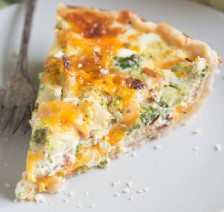 |
 |
|
A
mini Shepherd's pot pie |
A
slice of quiche |
A
lemon bar
|
When you are finished with that pie, you
could wait for another to be cooked and then have another, or
you
could get up and walk to another restaurant. You might walk over to a
restaurant that is serving nothing but small slices of freshly baked,
warm quiches, (the photo in the
middle).
After having one of those tiny quiches, you might
decide to walk around, or go to a music concert, or walk over to
another
restaurant for a mini taco, or a mini egg foo young, or a mini bowl of
chicken curry. Then you might walk over to a restaurant that has a
dessert, such as a freshly baked, warm, miniature apple pie,
peach pie, or lemon bar (the photo above).
Would this type of restaurant system be annoying?
We will never know until we find the courage to
experiment with it. However, I suspect that even though we will not
like the idea of walking around to get a complete meal, if we alter our
view of life and stop fantasizing about being pampered by
servants, and stop fantasizing about avoiding work,
I think we might discover that it, or something like it, provides us
with
a better life overall.
The reason is because this system of getting meals will force us to get
some exercise as we eat, which will help settle our food, and the
walking will help prevent us from eating to the point at which we do
not want to move. It will also increase the chances that we encounter
other people and decide to do something other than eat more food.
Providing the food slowly like this will also allow us to start
digesting the food, which will reduce the chances that we overeat
because the first tiny meal will start increasing our blood sugar,
helping us to feel full.
In other words, even though we dislike having to walk around, I think
it will be better for us, and provide us with a better life. Of course,
as soon as we start experimenting, we are likely to discover ways to
improve upon the system. Future generations may design a city and a
method of providing meals that we cannot imagine.
•
We get
more enjoyment from smaller portions
Animals are in a fierce competitive
battle for food, so they gobble food as quickly as possible, and
although humans inherited this tendency, we evolved a desire to make
meals a social activity. This ability to enjoy our food makes humans
somewhat unique among the animals.
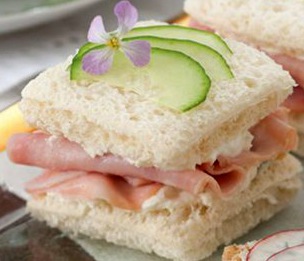
However, women are more capable than men
of eating slowly and enjoying their food, so men need some
help.
By
designing restaurants to provide smaller meals, we encourage people to
eat at a slower pace, and I think that will allow us to get more
enjoyment from our
food. This is another reason I suggest we experiment with restaurants
that provide us with small meals.
For example, if we were given a tiny little sandwich for our lunch,
such as the ham and pineapple sandwich in the photo to the
right, and then have to wait a few minutes before we get another mini
sandwich, it gives our mouth a chance to clean itself out. This will
allow the next mini sandwich to taste better.
By comparison, when we are given one large sandwich, it is very
difficult for us to exert the self-control to take a bite,
and then let our mouth clean itself out. It is more practical to
design the restaurants to force us to eat smaller
portions.
When I was in a small town of Germany in the 1980's, their local beer
produced so much foam that when somebody ordered a glass of it, it took
about 30 minutes to get it. When the person was finished with the beer
and asked for a refill, he had to wait another 30 minutes. The end
result is that drinking a couple of beers took a few hours,
forcing the people to relax and socialize. It was also unlikely for
somebody to become drunk because it required too much time
to drink enough beers to get drunk.
Restaurants could serve food in a similar
manner. Specifically, instead of giving us a large plate that is full
of food, we would be provided with a small portion of a meal. Some
number of minutes later we would get another portion of the meal.
The restaurant could also provide smaller forks and
spoons so that we
are forced to take smaller bites. This might also encourage us to
chew our food
more thoroughly so that we enjoy it for a longer period of time.
Why not experiment with our breaks
at work?
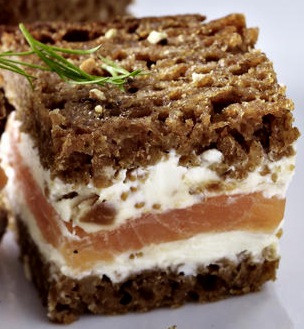
Another possible way of enjoying small
meals is to have three small meals during the work
day rather than one
big lunch. The lunch break would be mainly for recreation, not eating.
If businesses operated on that schedule, then in the morning everyone
would have a short break to have a mini meal.
Lunch would be a longer break, and we would have another miniature
meal, such as a smoked salmon sandwich (the
photo to the right), but we would spend most of the lunch
time relaxing or on some recreational activity.
Then a few hours later we would have another short break for another
min meal.
Would we enjoy that type of work schedule? I don't know. We would have
to try it for a few months. I mention these possibilities to help you
to realize that we have a phenomenal number
of options, and to
encourage you to find the courage to start experimenting
with our
culture. We are not going to improve anything unless we can wander away
from the established path and try something different.
• Warm
foods
are more pleasurable
Reindeer
evolved to eat frozen lichen, but humans evolved for warmer foods. Ice
cream, popsicles, and other frozen and cold desserts cause our tongue
to become
numb, which makes it less sensitive to foods, and the cold temperature
interferes with the vaporization of the chemicals that give food it's
odor. As a result, frozen foods require more sugar and flavorings than
warm foods.
It is also possible that by cooling the roof of our
mouth, the sensory organs in our nose decrease in temperature also,
which in turn could decrease their sensitivity to the flavoring
chemicals.
The same concept applies to foods that
are solid at room temperature, such as chocolate bars. We will not get
much satisfaction from a chocolate bar until it starts to melt in our
mouth. The problem is that as we chew on it, we start swallowing it,
which means that some of it goes into our stomach before it has had a
chance to titillate our mouth and nose.
The point of this
section is that frozen and cold foods require more sugar and flavorings
than warm foods. Therefore, it would be best for our health if we
eliminate the cold and frozen desserts and replace them
with desserts that are warm. By
providing a chocolate dessert that is warm, we don't need as much
sugar. Furthermore, a warm chocolate dessert doesn't need as much
chocolate, and since chocolate is bitter, reducing the chocolate
further reduces the amount of sugar we need.
If you doubt that
warm desserts provide us with more pleasure, here is an experiment that
you could try. Eat a chocolate bar, and measure the time it takes you
to eat it. Try to estimate how many minutes of pleasure you got from
that chocolate bar.
Then
make some chocolate chip cookies that are equal in calories to that
chocolate bar. You will not know for sure how many calories are in your
cookies, but take a guess. Then eat the chocolate chip cookies
while they are fresh and warm. Measure the time it takes to eat them,
and try to estimate how many minutes of pleasure you receive. Also,
pass judgment on whether the pleasure from the cookies is at the same
intensity level as it was from the chocolate bar, or if you got a
more intense pleasure from one of them.
|
Which
provides you with the most pleasure, assuming 100
calories for each: |
|
|
|
|
|

|
|

|
|
a) Warm
chocolate chip cookies? |
|
b) A cold chocolate bar? |
I think that if we could measure the
pleasure
that we receive from food, we will discover that for the same number of
calories, we get more pleasure from fresh, warm
chocolate chip cookies than from a cold chocolate bar.
I
think we would discover the same thing with frozen
items. For example,
if you were to eat 100 calories of peach ice cream, you would receive a
certain amount of pleasure for a certain amount of time. If you were to
make a fresh peach pie, and take a piece that has 100 calories, and eat
it while it is still fresh and warm, I think you will find that the
pleasure is more intense.
|
Which
provides you with the most pleasure, assuming 100
calories for each: |
|
|
|
|
|

|
|

|
|
a) Warm peach
pie? |
|
b) Cold peach ice cream? |
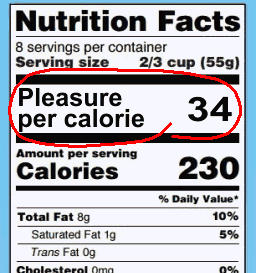
If we had a way of measuring
the pleasure that we received from food, we would be able to
create a "pleasure per calorie" value. Then, on the
food labels, instead of just listing the number of calories, protein,
and vitamins, there would also be the pleasure per calorie that
the "typical" person receives from the food. I think we would
discover that the cold and frozen foods have a lower
pleasure
per calorie than warm foods.
Ice cream, popsicles, chocolate bars, candy bars, and other cold and
frozen desserts are very popular desserts today, but I don't think it
is because we prefer them over warm desserts. I think it is because of convenience.
I think that if we were living in a city in which we had easy and free
access to a variety of foods, we would find that we prefer the warm
foods.
I suggest that Kastron government officials allocate labor and
resources to the development of small machines to make it easier for
the restaurants to produce small quantities of high quality food items
so that everybody in the city has easy access to fresh, warm food.
In other words, instead of having a gigantic factory that produces
thousands of loaves of bread, which are then distributed throughout the
city, we would develop a smaller machine to grind grains and make fresh
bread in small quantities. Those small machines
would be put into all
of the clusters of buildings so that everybody has easy access to
fresh, warm bread.
This also avoids the work involved with shipping bread throughout the
city. The bread would only have to be shipped within the cluster of
buildings that it was produced in, which could be accomplished easily
with robots because Kastron would be designed for robotic delivery
systems.
Likewise, every cluster could have small machines for providing fresh,
warm pies, cookies, and rotisserie chicken. None of those food items
would need preservatives because they would be made only when needed.
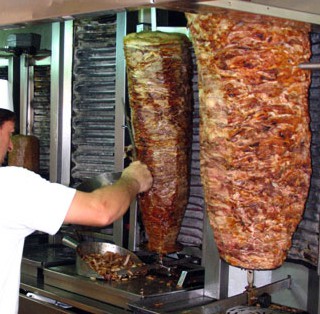 |
How
long does the meat sit in
the rotisserie before you eat it? |
The shops that make gyros are cutting
strips of meat from a large block of meat pieces that was on
the rotisserie for... how long? Days? Weeks? We have no idea how fresh
the meat is, and businesses in a free enterprise system are under no
obligation to tell us the truth.
I suggest that Kastron officials develop small machines that can do
rotisserie cooking of smaller amounts of meat so that we can have fresh
and warm meat.
If we can provide ourselves with a wide variety of fresh and warm
meals, we will have much less interest in frozen desserts, so nobody
would complain if the Kastron officials put tremendous restrictions on
frozen and cold foods in order to cut down the consumption of sugar.
We might even decide to prohibit chocolate bars and ice cream. If you
wanted a chocolate dessert, you would have to eat warm chocolate chip
cookies, a warm chocolate cake, warm chocolate oatmeal, warm chocolate
pudding, or a chocolate
fondue.
On hot summer days, the city could provide frozen desserts, but with
low sugar levels. Popsicles, for example,
would be mainly fruit
rather than sugar. Very ripe bananas are also useful as frozen
desserts, especially if they are heated up in their skin first, as I've
described here.
Certain grapes are also useful as a frozen dessert. Frozen peas can
also make a nice appetizer on hot days,
and they can be mixed with diced, frozen grapes and
other items to make a cold vegetable salad.
•
Difficult food items become practical
Restaurants
can provide us with foods that would be too difficult for us to make
for ourselves, or which require equipment that is too expensive or
complicated for home use. For example, consider popcorn.
A
lot of people make popcorn for themselves, but they do a very
simplistic job. Most people either use a popcorn machine, or they cook
the popcorn in a pan of oil. The popcorn machines do a better job, and
require less cleanup, but in both cases the popcorn is dry and
bland. Most people solve that problem by pouring butter on the popcorn.
However, most people are already eating excessive amounts of oil, so
they don't need more of it on their popcorn.
Furthermore, if we eat the
oily popcorn with our fingers, which almost everybody does, the oil
gets on our fingers, and everything we touch will
accumulate oil, such as furniture, doorknobs, and clothing.
My preferred
method of making popcorn is to use a hot air popcorn popper, and have
the popcorn fall into a plastic bag. Then I give it a very fine mist of
water. Then I sprinkle it with a flavoring, such as a mixture of
powdered salt, turmeric, and a bit of Stevia (or powdered sugar) to
counteract the
bitterness of the turmeric. There are lots of other spices and
flavorings that can be put on the popcorn, if they can be produced in a
powder form. Then I close the bag and shake it up. Then I give it one
final mist and a bit more of the flavoring, and shake it up again.
However,
it is difficult to do this. One reason is that the ordinary spray
bottles that are available to consumers do not create high-quality
mists. This can result in some popcorn that becomes wet and
soggy. It might be better to use a mist of hot water or steam, but
that's not easy to do.
Likewise, there is no easy way to sprinkle flavorings evenly over the
popcorn. This is why I close the bag and shake it.
If I do this
properly, the popcorn picks up some moisture from the mist, but it does
not become wet. This gives it a better texture than dry popcorn. At the
same time, the water causes the turmeric flavoring to adhere to the
popcorn. By doing this when the popcorn is still hot from the popcorn
machine, some of the water evaporates, which prevents it from
getting soggy. And, although the turmeric mixture will get on my
fingers, it is not
nearly as messy as oil.
If we were to develop a small machine
to pop the popcorn, and then immediately spray it with a high-quality
mist with flavorings, we would have warm but moist popcorn that has a
nice flavor, and without any additional oil. However, that type of
popcorn needs to be eaten immediately. It cannot be stored, packaged,
or shipped around the city. The restaurants would need the machine
inside the restaurant, and it would have to produce popcorn on demand.
Update 26 May 2022:
I have come to the conclusion that making popcorn moist is too difficult, and I have
discovered that I actually prefer crispy
popcorn. I have a description of it here.
|

|
Incidentally,
by eliminating the oil on the popcorn, we can reduce the salt. In case
you haven't noticed, we do not like to eat oil by itself. When we eat
something that is oily, such as peanuts or butter, we prefer that it to
have a lot of salt. Why is this? I don't know.
Perhaps somebody
will do some research into why we like the combination of salt and oil.
Furthermore,
by reducing the salt on the popcorn, it becomes easier for us to notice
the subtle flavor of the popcorn, turmeric, and whatever other flavors
we use. In case you had not noticed, the more salt or sugar that we put
on an item, the less we notice the flavor of the item.
Therefore, by figuring out ways to reduce the salt and sugar in our
foods, we can make the flavoring of the food more noticeable. To
complicate the issue, if we go to the extreme of not using any salt or
sugar, some
food items become less desirable.
•
There are
lots of things we can do with gelatin
There are also lots of food products that
restaurants could make with gelatin that most
people would not want to bother with. For example, gelatin can be added
to bread
products in order to give it a different and more moist texture. It
doesn't make the bread "better"; rather, it creates a different
texture, thereby providing us with variety. Gelatin
can also be
added to oatmeal, and it can be used in warm sauces for warm vegetable
salads, such as diced brussels sprouts, broccoli, carrots, or
cauliflower.
In this
document
I pointed out that gelatin does not have to be heated to a high
temperature in order to make gelatin products. Making gelatin products
at a low temperature takes more time, however, so most people don't
want to bother. However, a restaurant does not need to be in a rush,
and
we can also develop machines to help with the food preparation.
Therefore, restaurants could create a variety of gelatin
products that contain fruits and vegetables.
Since most children enjoy gelatin products, this will
provide children with food they enjoy, and which is
healthier than the artificially flavored sugar gelatin products that we
are currently getting from the free enterprise system.
•
Parents
will not have to tolerate children’s demands for food
In
Kastron, everybody gets meals from restaurants, and certain restaurants
will be designated for children, and others will be off-limits to
children. This will make it easy for the city officials to ensure that
the children are getting healthy meals.
This will also make life
nicer for the parents because they will not have to
tolerate children who demand candy bars, potato chips, or
soda. If
a child complains about the food, the parents will be able to stop it
easily by telling the child something to the effect of, "I have no control over the food we eat. The
city officials decide what we can eat."
•
We should develop high quality, frozen, prepared
meals
Businesses
are providing us with a lot of frozen meals that are already cooked and
only need to be warmed up. However, I think most of the frozen meals
are of low quality. There are only a few exceptions, such as the Foster
Farm chicken wings. They have done an excellent job of cooking the
chicken at a low temperature so that the meat is still tender and
juicy.
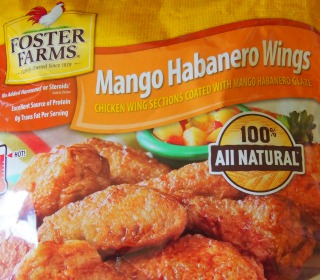 |
I
love these chicken wings,
but do they really need sugar?
|
However, Foster Farms does the
typical trick in the free enterprise system, which is to add sugar
to
the batter. Their Mango Habanero Chicken Wings also has stevia, which I
have no objection to, but I don't think we should put sugar into meat
products, except for special occasions, because we already eat too much
sugar.
When sugar is added to a meat product, it should be
classified as "candy" or as a "dessert". The most extreme examples that
I am aware of are the hams and turkeys from the Honey Baked
Ham Company. It is deceptive to describe
their food products as "meat". According to their website,
109 grams of their roasted turkey breast has 10 grams of sugar. That is
almost 10% sugar! That should not classify as
"turkey" or as "meat". That should classify as "turkey candy"
or "candied turkey".
The Foster Farms chicken wings are proof that it is possible to
cook
and freeze chicken wings so that the meat remains juicy,
delicious, and
tender. My
suggestion is for the Kastron government to support the research and
development of frozen, prepared meals. The
reason is because frozen, prepared meals have a lot of
advantages.
If we can develop a wide variety
of good tasting, high quality, and healthy frozen prepared meals, we
will make
it much easier to operate restaurants. Actually,
some restaurants could
be completely automated. We would give our order to a computer, and the
computer would remove
the appropriate meal from the freezer, warm it up for us, and let us
know when it is ready, or send a robot to deliver it to us. If we were
in a rush, we could use our cell phone or computer to request the meal
for a certain time, and the meal would be ready for us when we arrived
at the restaurant.
The restaurants that were warming up these frozen meals would not
produce any smoke or fumes, and they would not have any pots or pans
to clean up. The only items that would need cleaning would be
the dishes and utensils that the people used to eat the meal
with.
With a wide variety of frozen meals, human chefs would be needed only
to produce special meals, or to produce meals that did not freeze very
well.
•
Farmers become ordinary
employees
In
a free enterprise system, farmers are responsible for natural events
that are beyond their control, such as hailstorms, insects, and
diseases. This results in farmers who fear that nature will destroy
their crops and animals, and that fear causes the farmers to use a lot
of pesticides, herbicides, antibiotics, hormones, and other chemicals
of questionable safety.
By putting the government in control of the farms, the farmers become employees,
and they are no longer responsible for natural disasters. If a
hailstorm, fungus, or insects destroy a particular crop, for example,
it becomes the government's problem.
The Kastron
government will support research programs to reduce the destruction by
nature. For example, they may fund research programs to determine if it
is practical to make greenhouses that are biologically isolated from
the world so that fungus and insects cannot get inside.
Another
possible solution, for certain crops, might be to develop farm
machinery that makes it practical to use an "agricultural quilt"
technique of farming. Instead of planting a gigantic field with just
one crop, a machine would plant tiny patches of cabbage, and then
another machine, possibly at a later date, would plant tiny patches of
carrots in some of the vacant areas of that same field, and then later
another machine would plant some tiny patches of beets. The end result
would be an "agricultural quilt" of vegetables. The mixture of plants
might significantly reduce the spread of certain insects and diseases.
The
"agricultural quilt" farms would be impossible to do with the farming
equipment of today, but we could develop machines to make it work,
if the concept proved to be useful. The machines could be automated so
that people don't have to bother driving them. The cabbage harvesting
machine, for example, would drive itself through the quilt of crops and
pick out only the cabbage. On another day, the carrot harvesting
machine could drive down the aisles and pick up the carrots.
The
biologically isolated greenhouses, and the machines that support
agricultural quilts, would be expensive to produce and maintain, but in
a city that doesn't use free enterprise, expensive farming equipment
can be justified.
To understand this concept, consider an
example I've mentioned in a previous document; specifically, mowing
lawns. Imagine that a city has a million homes, each with a private
yard. That city requires a million small lawnmowers. If each person
spends an hour a month mowing his lawn, and if they do this eight
months of the year, that means the people put 8
million hours
every year into mowing lawns. In addition, the city needs people to
work on assembly lines to produce lawnmowers, and people are
needed to spend time on lawnmower maintenance and recycling.
If
those same people were living in Kastron, then the land between the
clusters of buildings belongs to the city. Therefore, the city does not
need a million small lawnmowers to mow the grass. Instead, the city
would use a small number of much larger lawnmowers. Furthermore, the
city could afford to make those lawnmowers so automated that they
operate at night so that nobody is bothered by the mowing of
lawns. The machines
would follow predetermined paths, and have cameras and other sensors to
avoid unexpected obstacles.
Although those lawn mowing machines would be expensive
to produce and maintain, the city would need only a few of them. The
city would not need anywhere near 8 million hours of labor a year
to mow lawns.
Farmers don't have to deal with equipment
decisions
Another advantage to the farmers by becoming
employees is that they do not have to deal with the decisions of what
type of equipment to get for their farm. Instead, the government
officials will decide what type of equipment the farms need, and they
will tell the businesses to develop and produce it. The businesses will
produce farming equipment according to what the government wants, not
according to what the farmers want. The government will also be
responsible for maintaining all of the equipment.
The Kastron
government would provide the farmers with high quality and efficient
tractors, drones, robotic devices, sensors, and other equipment, rather
than low cost items that are affordable to a farmer in a free
enterprise system. The machinery that the farmers need only
occasionally, such as machines to harvest crops, and drones to inspect
an area, would be shared among the farmers, just as employees within
IBM share equipment.
Farmers can work more normal hours
Another advantage to the farmers in
Kastron is that their work hours and schedules would become more
"normal". Although some farmers already have a desirable work schedule,
some of them claim to be working more
than
15 hours a day, month after month. It would be acceptable for them to
work that much if they truly enjoyed doing it, but some of them are
working that much because they cannot afford the employees
and/or
equipment that they need. This situation can occur when a person is
trying to get a new farm established, or when he is recovering from a
natural disaster.
In
a free enterprise system, the people who start businesses, or who are
recovering from some type of economic problem, may have to spend years
struggling to gather enough money to afford the equipment and employees
they need. This gathering of money is a waste of time.
From the point
of view of society, we should provide everybody with the equipment they
need to be productive, regardless of whether they are farming,
repairing bicycles, making meals at a restaurant, or doing scientific
research.
This concept is similar to what I mentioned in Part 1
of this series in which I pointed out that if we alter our view of the
human lifespan,
we will not want a child to waste his youth on
gathering money to afford a home or paying for an education. We would
instead provide everybody
with an education and home.
Likewise, it is foolish
to make a person struggle for years to afford the equipment that he
needs to do his job efficiently. From the point of view of society,
everybody should be provided with whatever they need to become
productive immediately.
The farmers can have a more normal
social life
The families of the farmers will also benefit from
the Kastron economic system because the farmers will be able to
live in the clusters of apartment buildings, which will allow
their families to live among people and social activities,
rather than be isolated on a farm. The underground trains could quickly
take the farmers to whichever farm they needed to get to, and without
any concern about the weather.
To reduce the time farmers have
to spend on the farm, the city could put cameras around the farms so
that farmers can check on animals and crops from any phone or computer
in the city. For areas where there are no cameras, the farmers could
send drones or robotic cameras. When robots become more advanced, the
farmers could also send them to do work, such as harvest crops, remove
weeds, and feed animals.
If a farmer is involved with crops that are
seasonal, he could switch to another job during the months
when
there is nothing for him to do, and not necessarily in the farming
area. For example, a person might want to be involved with producing
vegetables during the spring and summer, while spending autumn and
winter working in the city with everybody else in a restaurant,
factory, bicycle repair shop, museum,
or school.
Farmers
don't have to worry about overproducing
food
In
a free enterprise system, farmers have to be concerned about producing
too much food. In Kastron, however, the government decides how
much
of every type of food to produce. The government is responsible
for the mistakes of producing too much or too little food.
The Kastron
officials will do a job that is similar to that of the management of a
Navy ship. Before a ship leaves port, the management has to decide
which foods to bring on the ship, and in what quantities. As the ship
travels around, the chefs make meals according to the food on the ship,
not according to what they wish to do.
The Kastron officials
will have a similar task. They will know exactly who is in the city,
and their ages. This will let them know how many adults and children
they need to provide meals for every day. They will also have
historical data about how much food has been eaten in the past. The
officials will use that information to determine how much of every food
item the farmers should produce.
•
Which
foods should be seasonal?
In
a free enterprise system, businesses pander to the consumers, so
businesses do everything they can think of to provide seasonal fruits
and vegetables throughout the year. One trick that works with apples is
to use a controlled
atmosphere
storage system. Another method of providing fruits and vegetables that
are out of season is to import them from the other side of the planet.
For example, in my city, some markets are importing blueberries and
other fruit from Chile.
Are the apples that have been stored for
months with this system really tasty enough to justify doing it? My
personal opinion is that these storage systems are not worth the
trouble. Are the blueberries and other fruit from Chile worth the
trouble of importing them? The bananas from South America are
acceptable, but the blueberries and certain other fruit have to be
harvested too young and/or end up too moldy to make them worth it to me.
My
opinion is that a lot of the fruits and vegetables in the markets are
of unacceptably low quality. I think the reason they are selling so
well is because most people grew up eating those fruits and vegetables,
and so those low quality foods seem "normal" to them, rather than
inferior in flavor and
texture.
Most people do not have fruit trees, or grow their own
vegetables, so they don't know what apricots, walnuts, apples, pears,
persimmons, and other items are supposed to taste like. Walnuts, for
example, lose their flavor quickly once they are removed from their
shell, but most people have never had a fresh walnut. Some markets sell
walnuts in their shells, and although they are higher in quality than
the shelled walnuts, they are lower in quality than what they should be
because they have been through abusive cleaning and polishing machines
in order to make them visually attractive to the ignorant consumers.
Most
people who grow or purchase fuyu persimmons do
not realize
that they can be left on the tree until they start becoming soft, and
they will continue to ripen and soften after picking. My own brother,
who has one of those trees in his yard, even insisted that I was
incorrect, and that those type of persimmons cannot become soft. Like
most people, he cannot control his arrogance. He still believes the
official story about the 9/11 attack, the Apollo moon landing, and
other issues. I don't waste my time talking to him any more.
A
couple years ago I recorded some video of fuyu persimmons that
I
picked when ripe, and then let ripen until they become soft in order to
show people that it is possible, but I haven't yet bothered to edit it
into a video for YouTube. Perhaps I'll find the motivation soon.
In
a free enterprise system, the businesses focus on profit, not on the
quality of food, or the quality of human life. The farmers and markets
are pandering to consumers who are ignorant about food, and who judge
food by visual image rather than by flavor. This is resulting in a lot
of low quality food items selling in large amounts.
People who
have higher standards for food, and who know more about food, should
make decisions for the public. Likewise, we should not let the public
make decisions about GMO crops, or other
issues that they know nothing
about.
Since Kastron will not have free enterprise, farmers and
businesses will not pander to the citizens. Instead, the Kastron
officials will decide what to do about seasonal fruits and vegetables.
My suggestion is to be more concerned with the quality
of our food
rather than its visual image.
Rather than try to store fresh
fruit and vegetables in controlled atmospheres, and rather than try to
import fruit that has a very short shelf life, it might be better to freeze
some of the crop.
When my plum, peach, or apricot tree
has a large crop, I harvest the fruit as it ripens, remove the seeds,
and warm the fruit up to about 140°F for the apricots and peaches, and
up to 160°F for the plums, in order to break down the enzyme that seems
to cause deterioration, and I add ascorbic acid in case that helps to
preserve them, and then I freeze the slurry. That does not provide me
with fresh fruit, but it has an excellent flavor. Since the fruit is
ripe when I do this, it doesn't need any additional sugar, but a little
Stevia and/or sugar will make it into a delicious dessert.
Rather
than try to store fresh fruit for the off-season, and rather than
import low-quality fruit, I think it would be better for us to put
research into freezing fruit. We should study
whether the fruit should
be heated, and if so, to what temperature, and for how long. Should
ascorbic acid or some other chemical be added to the fruit? What
temperature should the freezer be?
By
figuring out how to freeze fruit without ruining the flavor, we can
have delicious jams, pies, tarts, and gelatin desserts all throughout
the year.
•
There may
be occasional shortages of some foods
The
Kastron government will try to produce only as much food as is
necessary
so that they don't waste labor and resources. This can result in
shortages of certain types of food. For example, imagine that a natural
disaster destroys the cantaloupe crop. In a free enterprise system, the
stores would respond by importing cantaloupe from other areas of the
world, possibly at a high expense, but the Kastron government does not
pander to the people. Instead, the government officials would discuss
what would be best for the city.
They may come to the
conclusion that there is so much other food that they are not going to
waste labor and resources on the importation of cantaloupe, in which
case they
will tell the citizens that there is no cantaloupe this season. The
citizens will have to deal with it quietly rather than whine about it.
In
a democracy, the government would never be able to get away with that
type of policy, but this is the policy we find in all other
organizations. For example, if a Navy ship were to discover that their
shipment of cantaloupes has gone moldy, they would tell the sailors
that there is no cantaloupe, and the sailors would deal with it quietly.
A "normal" family also follows this policy. For example, if a
mother purchases a
cantaloupe, and if she discovers that it is rotten,
she will tell her children that there is no cantaloupe for that meal. A
"normal" mother will not rush to the
market to get another cantaloupe in order to appease children
who
whine that they were promised a cantaloupe.
•
Scarce
foods would be shared
With modern technology, we can produce
such an excess of food that it is absurd for us to compete
for food. We should provide everybody with free food.
The exception would be the foods that are in short supply, such as
certain types of seafood, truffles, and seasonal foods.
In
a free enterprise system, the scarce food items are set to a higher
price. This
encourages stupid, monkey behavior in which the wealthy people purchase
expensive food items and titillate themselves with thoughts of how
special they are for being able to afford the most expensive lobsters,
truffles, caviar, and other "delicacies", and it encourages other
people to pout, be envious, or become angry.
In reality, most of the
scarce food items are foods that humans don't have a strong attraction
to. They are not delicacies. Rather, they
are scarce. It is detrimental for
us to treat those items as if they are special foods that make our life
worthwhile.
Since everybody in Kastron will have virtually the
same material wealth, there will be no wealthy people, so we need a
different method of distributing the scarce food items. One method is
to share those items. For example, during one year,
some of the people
who want caviar, lobster, and truffles would be given access to them,
and during
the next year a different group of people would have access to them. By
sharing the scarce foods in this manner, everybody who wants them will
eventually get them.
I predict that many people in Kastron will
discover that they don't care much for those "delicacies", and they
will decline to eat some of those items when it is their time to have
them.
Caviar, for example, is as unappealing to me as the salmon eggs that
people use as bait to catch fish. I prefer chicken, pork, and
other meats.
I like filet mignon, but I think other cuts of beef have more flavor. I
think the attraction to filet mignon is because it is expensive.
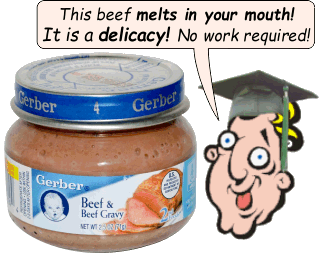
Also, filet mignon is easy
to chew, and most people have the attitude that the
less work we do, the better our life
becomes. I think
we are promoting a bad attitude when we boast about food that "melts
in our mouth."
We should stop promoting the attitude that being pampered like a baby,
and given soft foods like a baby, is going to make our life better.
Another
method of dealing with scarce foods is to offer them as rewards
for
something, such as to people who volunteer for chores that nobody wants
to do, or people who have done something exceptional.
Of course, if
somebody offered me caviar or lobster in return for doing a chore, I
would consider that to be a punishment rather than
a reward. That type
of "reward" would be appreciated only by people who truly want to eat
those items. I would consider a rack of lamb, crispy chicken
drumsticks, or a pork roast to
be a reward, as well as ripe, red
cherries,
apricots, persimmons, and other fruit.
•
Apartment
buildings will be cleaner
and safer
Another benefit to living in apartments
that do not have kitchens or dining rooms is that people will not be
eating food in their homes, or in the elevators or hallways, which
means that the homes will remain
cleaner, thereby reducing the problem of cockroaches, rats, and other
creatures.
It will also significantly reduce the amount of
trash produced at the apartments. Furthermore, since most of the stench
of trash comes from food related garbage, that means the apartments
will smell better inside, and wherever the trash is collected.
Furthermore, the air in the apartments will be cleaner and safer to
breathe because there will never be any burnt oil, a stench of
frying
fish, or any type of burnt food. This will also result in the walls and
ceilings of the apartments remaining cleaner, and so will
everybody's clothing, furniture, and other items. The reason is because
there will
not be billions of tiny droplets of oil drifting around to collect on
walls or items.
Many people have noticed that cigarettes create an oily
residue that sticks to walls and clothing, but they have not noticed
that cooking food at high temperatures does the same thing, but with
food oils rather than tobacco oils. I cook food at a low
temperature mainly because I think the food tastes better, but
partly because it's easier to clean up afterwards; partly to avoid
breathing the fumes; and partly to
prevent the walls and furniture from getting coated with food
oils.
Another benefit to not having kitchens is that it will eliminate the
main cause of fires. According to
statistics, most of the fires in both houses
and apartments
are caused by cooking.
Another advantage is that there will be fewer cooking related injuries,
such as being cut by a knife, or burned by a stove or hot liquids.
This will be especially important for people who have babies and young
children. Parents will not have to worry about their children getting
into the kitchen or dining room.
•
Meals
will be healthier, eventually
Most people boast that they eat healthy
meals, but in reality, none of us truly knows what is healthy for a
human. Furthermore, each of us are genetically unique, so a healthy
diet is different for each of us.
There are only some foods that scientists can prove are definitely bad,
or need to be processed in certain ways. For example, scientists can
prove that we must cook red kidney beans at a certain temperature for a
certain amount of time in order to destroy a chemical that causes
trouble for us. Scientists can also create charts that show us how long
a particular food needs to be cooked at various temperatures in order
to kill salmonella.
However, scientists do not yet know enough about cholesterol or red
meats to tell us what our consumption of eggs, beef, pork, and other
items should be.
The government officials of Kastron will determine which food items to
produce, and they will provide the restaurants with guidelines for
meals,
but the government will impose a rule only if it can be
backed up with scientific evidence. For example, the government will be
able to require red kidney beans to be cooked in a certain manner, but
they cannot prohibit eggs or red meat.
As scientists learn more about food and health, the government can
increase the restrictions on how meals can be made. Eventually the
scientists will know so much about human health that the government
will be able to dictate exactly how meals can be
made. In that distant
future, the restaurant chefs will choose recipes that have been
designed by scientists, rather than create their own recipes, or follow
recipes from Betty Crocker or Aunt
Jemima.
In Kastron, each person will go to the
restaurants that serve the meals that they want to eat. This requires
that all of the restaurants identify the recipes of their meals.
Although the restaurants in Kastron are in competition to attract
customers, they are not independent businesses of a free enterprise
system. The restaurants belong to the city, and the
chefs are employees
of the city. The chefs cannot keep their recipes a secret, or copyright
their recipes. They must disclose their recipes to their customers so
that everybody can decide if they want to eat the food.
Furthermore, the chefs will not be able to deceive people by saying
that their meals contain "flavorings" or "spices". Instead, they have
to identify what is in the meals. The chefs must treat us as friends
and team members, not as profit opportunities.
 |
The
gold foil is exploiting people,
not
treating them as friends. |
The citizens will have a wide variety of
restaurants to choose from, but they will not be able to influence how
the restaurants make the meals. The restaurants will be competing with
each other, but they will not be allowed to pander to the citizens. The
chefs will be employees of the city, and like all employees, they will
be expected to treat people in a respectable manner.
For example, the chefs
will not be able to attract customers by increasing the sugars or
artificial flavors in their food, or by putting gold foil on
bagels to
make customers feel special.
Instead, the restaurants will design meals according to what the
government determines is "healthy". Since we don't truly know enough
about human health to say exactly what a healthy meal is, the
government will fund research programs into the issue, and the recipes
will be continuously adjusted as we learn more about health.
Since people
will be able to choose their restaurants, some people, especially
children and teenagers, might choose to eat only at the restaurants
that provide desserts, or some other food that would be inappropriate
when it becomes a major part of their diet. However, when the
government is in control of the entire city, we have a tremendous
number of options to deal with that issue.
For example, the
government would impose restrictions on the food that children
and teenagers have access to, just as parents put restrictions on their
children. Also, many restaurants would be off-limits to children and
teenagers, such as those that serve desserts.
Adults would have
a lot more freedom to make bad decisions. If an adult chooses to eat an
unhealthy diet, my
suggestion is to regard him in the same manner as an adult who does
other
detrimental things to himself, such as cut himself with a knife, or
drink excessive amounts of alcohol.
We have a responsibility to take care of children,
but when adults
do something detrimental, my suggestion is that we tell them to deal
with the consequences. We should not feel sorry for them, or give them
special pampering or treatment. If an adult becomes sickly as a result
of his excessive consumption of candy, for example, we do not
have to provide him with medical services. We could tell him
to suffer the consequences, or we could evict him
from the city on the grounds that he doesn't have the mental abilities
to handle the freedom that the city provides him.
Since we all have strong cravings for sugar, the government
could help us control our consumption of sugar in a lot
of different ways. For example, the government could restrict candies,
donuts, honey glazed hams, apple strudels, coffee cakes, pies, and
other sweet foods to the people who do physical labor during their
jobs. For the office workers, the sweet foods could be restricted to
the weekends, or available only to people who get involved with
some type of physical activity.
For the people who are not
involved with physical activities, the government could restrict them
to desserts that have very low levels of sugar, and/or stevia, monk
fruit, xylitol, and erythritol.
Another possibility for dealing with sugar is to put
more resources into breeding plants that are less bitter, and therefore
don't require so much sugar.
What is the best policy? There
is no such thing as a "best" policy. If you can suppress your fear of
the unknown and find the courage to wander off the established path,
you will realize that we have a tremendous number of options available
to us. We simply have to start experimenting with
our options, observe the results, and discuss which option is
giving us the best life overall.
|